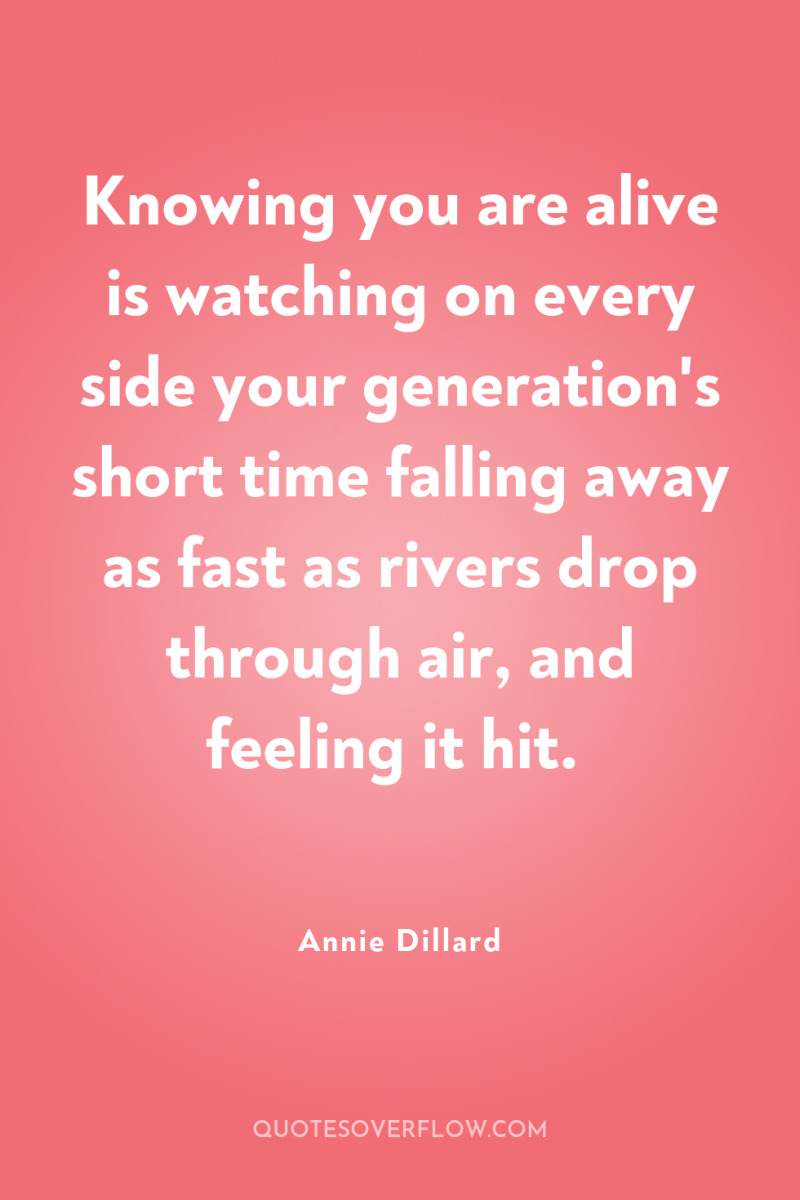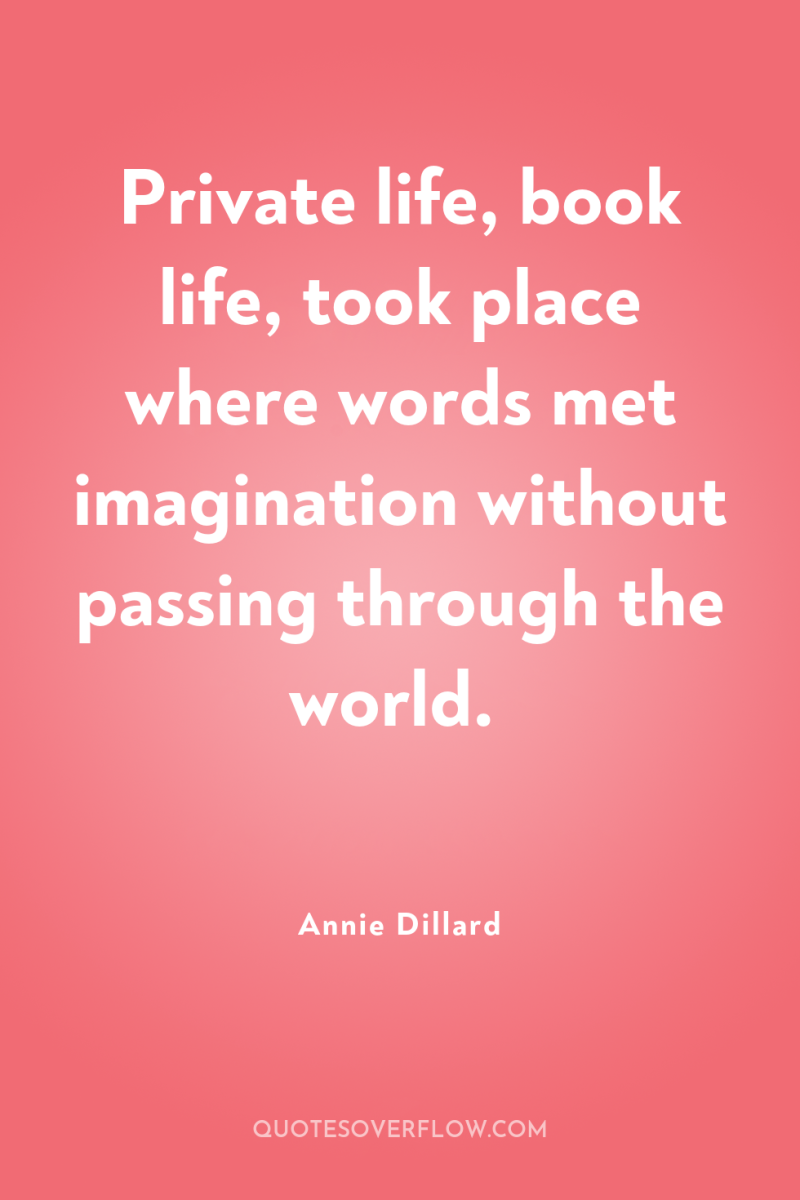1
Those of us who read carried around with us like martyrs a secret knowledge, a secret joy and a secret hope: There is a life worth living where history is still taking place; there are ideas worth dying for, and circumstances where courage is still prized.Annie Dillard

2
Knowing you are alive is watching on every side your generation's short time falling away as fast as rivers drop through air, and feeling it hit.Annie Dillard

3
Private life, book life, took place where words met imagination without passing through the world.Annie Dillard
4
Father had stretched out his long legs and was tilting back in his chair. Mother sat with her knees crossed, in blue slacks, smoking a Chesterfield. The dessert dishes were still on the table. My sisters were nowhere in evidence. It was a warm evening; the big dining-room windows gave onto blooming rhododendrons. Mother regarded me warmly. She gave me to understand that she was glad I had found what I had been looking for, but that she and father were happy to sit with their coffee, and would not be coming down. She did not say, but I understood at once, that they had their pursuits (coffee?) and I had mine. She did not say, but I began to understand then, that you do what you do out of your private passion for the thing itself. I had essentially been handed my own life. In subsequent years my parents would praise my drawings and poems, and supply me with books, art supplies, and sports equipment, and listen to my troubles and enthusiasms, and supervise my hours, and discuss and inform, but they would not get involved with my detective work, nor hear about my reading, nor inquire about my homework or term papers or exams, nor visit the salamanders I caught, nor listen to me play the piano, nor attend my field hockey games, nor fuss over my insect collection with me, or my poetry collection or stamp collection or rock collection. My days and nights were my own to plan and fill.Annie Dillard
5
The interior life is often stupid. Its egoism blinds it and deafens it; its imagination spins out ignorant tales, fascinated. It fancies that the western wind blows on the Self, and leaves fall at the feet of the Self for a reason, and people are watching. A mind risks real ignorance for the sometimes paltry prize of an imagination enriched. The trick of reason is to get the imagination to seize the actual world–if only from time to time.Annie Dillard
6
I had a head for religious ideas. They were the first ideas I ever encountered. They made other ideas seem mean.. I had miles of Bible in memory: some perforce, but most by hap, like the words to songs. There was no corner of my brain where you couldn't find, among the files of clothing labels and heaps of rocks, among the swarms of protozoans and shelves of novels, whole tapes and snarls and reels of Bible.Annie Dillard
7
A child is asleep. Her private life unwinds inside skin and skull; only as she sheds childhood, first one decade and then another, can she locate the actual, historical stream, see the setting of her dreaming private life–the nation, the city, the neighborhood, the house where the family lives–as an actual project under way, a project living people willed, and made well or failed, and are still making, herself among them. I breathed the air of history all unaware, and walked oblivious through its littered layers.Annie Dillard
8
For as long as I could remember, I had been transparent to myself, unselfconscious, learning, doing, most of every day. Now I was in my own way; I myself was a dark object I could not ignore. I couldn't remember how to forget myself. I didn't want to think about myself, to reckon myself in, to deal with myself every livelong minute on top of everything else - but swerve as I might, I couldn't avoid it. I was a boulder blocking my own path. I was a dog barking between my own ears, a barking dog who wouldn't hush. So this was adolescence. Is this how the people around me had died on their feet - inevitably, helplessly? Perhaps their own selves eclipsed the sun for so many years the world shriveled around them, and when at least their inescapable orbits had passed through these dark egoistic years it was too late, they had adjusted. Must I then lose the world forever, that I had so loved? Was it all, the whole bright and various planet, where I had been so ardent about finding myself alive, only a passion peculiar to children, that I would outgrow even against my will? .Annie Dillard
9
What can we make of the inexpressible joy of children? It is a kind of gratitude, I think–the gratitude of the ten-year-old who wakes to her own energy and the brisk challenge of the world. You thought you knew the place and all its routines, but you see you hadn’t known. Whole stacks at the library held books devoted to things you knew nothing about. The boundary of knowledge receded, as you poked about in books, like Lake Erie’s rim as you climbed its cliffs. And each area of knowledge disclosed another, and another. Knowledge wasn’t a body, or a tree, but instead air, or space, or being–whatever pervaded, whatever never ended and fitted into the smallest cracks and the widest space between stars.Annie Dillard
10
The interior life expands and fills; it approaches the edge of skin; it thickens with its own vivid story; it even begins to hear rumors, from beyond the horizon skin’s rim, of nations and wars. You wake one day and discover your grandmother; you wake another day and notice, like any curious naturalist, the boys.Annie Dillard
11
The rock I'd seen in my life looked dull because in all ignorance I'd never thought to knock it open. People have cracked ordinary New England pegmatite - big, coarse granite - and laid bare clusters of red garnets, or topaz crystals, chrysoberyl, spodumene, emerald. They held in their hands crystals that had hung in a hole in the dark for a billion years unseen. I was all for it. I would lay about me right and left with a hammer, and bash the landscape to bits. I would crack the earth's crust like a piñata and spread to the light the vivid prizes in chunks within. Rock collecting was opening the mountains. It was like diving through my own interior blank blackness to remember the startling pieces of a dream: there was a blue lake, a witch, a lighthouse, a yellow path. It was like poking about in a grimy alley and finding an old, old coin. Nothing was at it seemed. The earth was like a shut eye. Mother's not dead, dear - she's only sleeping. Pry open the thin lid and find a crystalline intelligence inside, a rayed and sidereal beauty. Crystals grew inside rock like arithmetical flowers. They lengthened and spread, adding plane to plane in awed and perfect obedience to an absolute geometry that even the stones - maybe only the stones - understood.Annie Dillard
12
Outside the study hall the next fall, the fall of our senior year, the Nabisco plant baked sweet white bread twice a week. If I sharpened a pencil at the back of the room I could smell the baking bread and the cedar shavings from the pencil.. Pretty soon all twenty of us - our class - would be leaving. A core of my classmates had been together since kindergarten. I'd been there eight years. We twenty knew by bored heart the very weave of each other's socks.. The poems I loved were in French, or translated from the Chinese, Portuguese, Arabic, Sanskrit, Greek. I murmured their heartbreaking sylllables. I knew almost nothing of the diverse and energetic city I lived in. The poems whispered in my ear the password phrase, and I memorized it behind enemy lines: There is a world. There is another world. I knew already that I would go to Hollins College in Virginia; our headmistress sent all her problems there, to her alma mater. "For the English department, " she told me.. But, "To smooth off her rough edges, " she had told my parents. They repeated the phrase to me, vividly. I had hopes for my rough edges. I wanted to use them as a can opener, to cut myself a hole in the world's surface, and exit through it. Would I be ground, instead, to a nub? Would they send me home, an ornament to my breed, in a jewelry bag? .Annie Dillard
13
Evidently, a given object took no particular amount of time to draw; instead the artist took the time, or didn’t take it, at pleasure. And, similarly, things themselves possessed no fixed and intrinsic amount of interest; instead things were interesting as long as you had attention to give them. How long does it take to draw a baseball mitt? As much time as you care to give it. Not an infinite amount of time, but more time than you first imagined. For many days, so long as you want to keep drawing that mitt, and studying that mitt, there will always be a new and finer layer of distinctions to draw out and lay in. Your attention discovers–seems thereby to produce–an array of interesting features in any object, like a lamp.Annie Dillard